Highest Level. Higher Calling.
Lipscomb Athletics’ spiritual formation program reveals the big picture of sport for students, showing them who they can become with trophies and God.
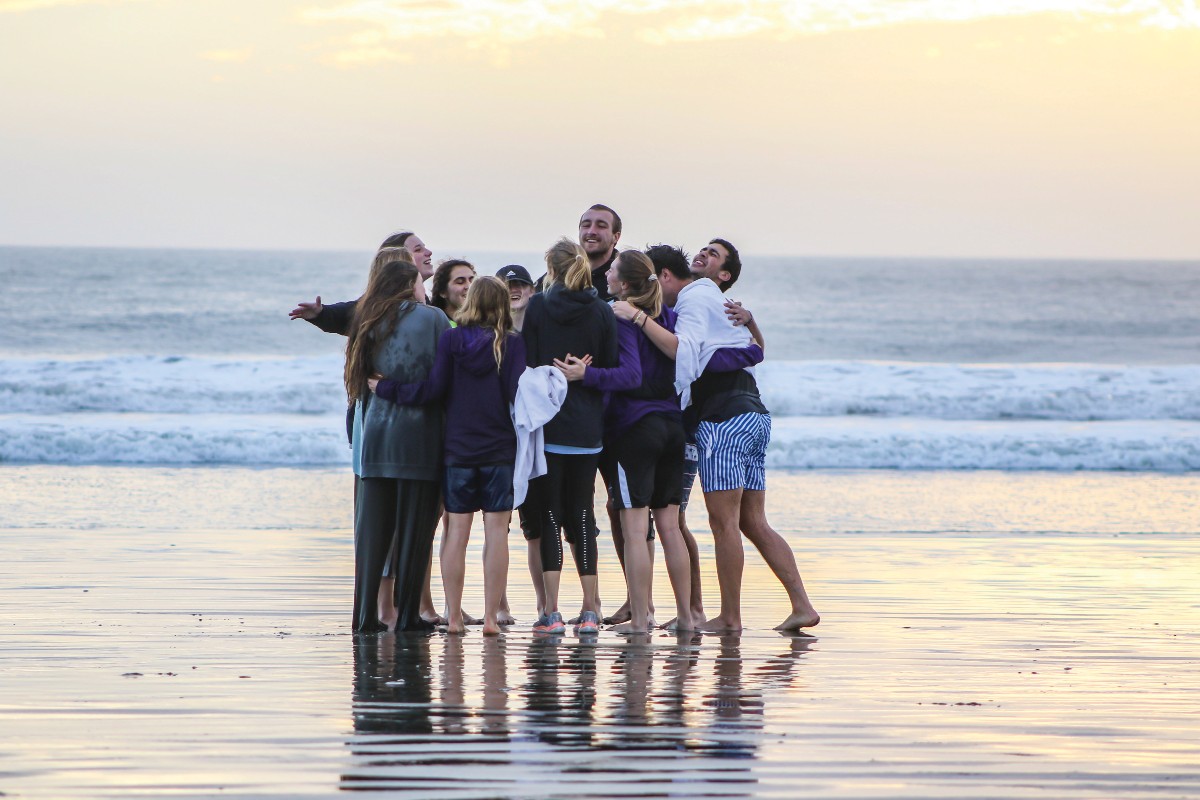
Lipscomb's student athletes have brought service to 12 nations on Athletics-hosted mission trips around the globe.
In the past 20 years, since moving to NCAA D1, Lipscomb Athletics has been on a steady rise, achieving what most would expect: ASUN championships, NCAA postseason appearances, students with trophy walls full of honors.
But what many may not expect, is that the department has accomplished all this while also bringing more than 150 student athletes to Christ through baptism, bringing Christian love and service to 12 nations on mission trips around the globe and providing spiritual encouragement to hundreds of local elementary school students for 10 years.
While Lipscomb Athletics molds student athletes to perform at their highest level on the field, it also is intentionally devoted to exposing student athletes to a higher calling, one that encourages them to lay those trophies down in life and focus on God.
Established in 2012, athletics’ spiritual formation program continuously works to grow student athletes in faith through 25 programs from mentoring to chapel services, from a fellowship of Christian Athletes chapter to service opportunities both near and on foreign soil.
“There are a lot of NCAA D1 schools in the country and a lot of Christian schools in the country, but there are not a lot of universities that have invested in nurturing the spirituality of their student athletes, leveraging that opportunity to help them grow as people and followers of Jesus,” said Chris Klotz, athletics’ director of spiritual formation.
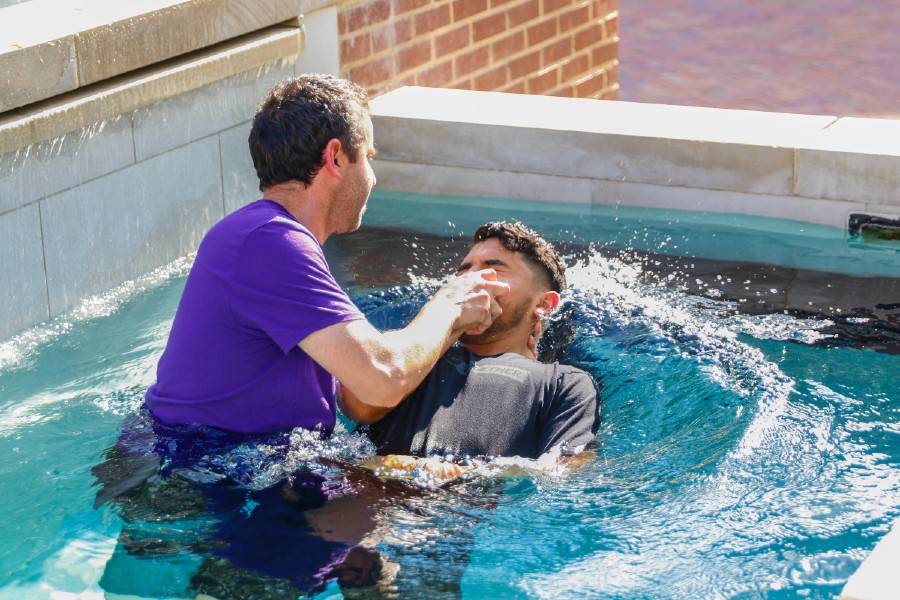
Athletics' spiritual formation program has brought more than 150 student athletes to Christ through baptism since it was established in 2012.
Klotz credits Brent High (BA ’96, MS ’11), former associate athletic director for spiritual formation, for establishing the foundation of the program in 2011 and 2012, and Athletic Director Philip Hutcheson (BA ’90, LA ’86) for going all in to fund and prioritize spiritual formation for student athletes.
High started Lipscomb’s first Fellowship of Christian Athletes chapter in 1997, led the first athletics mission trip to Honduras and in that same year recruited Klotz and Shannon O'Brien (MDiv ’20), then-women's director of spiritual formation and now women’s golf coach, to carry on building the program.
“I think the world of athletics has its own culture. It speaks its own language,” said Klotz. “There is so much you can experience in sport that is so biblical. When you think about servanthood, excellence, denying yourself, sacrifice—these are pillars that are common within athletics.”
Klotz, called “Klotzy” by the campus community, knows that truth from firsthand experience. He played college soccer in his home state, at the University of California at Irvine, where a friend, Todd Elkins, introduced him to the amateur team Southern California Seahorses, owned by Missionary Athletes International (MAI).
Elkins asked Klotz the question that changed his life: “Why do you play soccer?” And when Klotz’s answer was largely about himself, his friend challenged him to think about what his life could be “if soccer wasn’t just about you. Todd put his arm around me and walked me toward God,” said Klotz. After college, he joined the Charlotte Eagles, a United Soccer League team also owned by MAI.
During his time on the team, Klotz went on many international tours playing games all over the world, which instilled in him a love for Africa. He began carrying out church-centered sports ministry in Africa, teaching churches how to use a soccer ball to bring people to the Lord.
We always outnumber the kids because the college kids came alive in that setting. — Chris Klotz
Upon taking on his full-time spiritual formation role in 2015, the first thing Klotz established was a local opportunity for students to serve consistently: Carter-Lawrence Elementary School, located just a couple of miles from campus.
Every Thursday, a different athletic team coordinates the after-school Sports Fun Club to help students with homework, encourage them and build personal relationships while playing sports. Many student athletes continue to serve at Sports Fun Club even after their team visit, said Klotz.
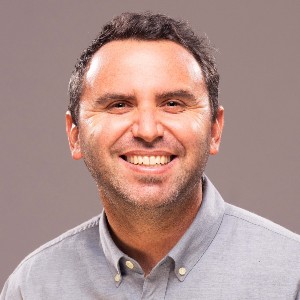
Chris Klotz
“We always outnumber the kids because the college kids came alive in that setting,” said Klotz.
In the first few years, the student athletes focused on connecting and building relationships through play, but the Sports Fun Club was so successful that later the school began placing the most at-risk students in the after-school program for tutoring and to see strong role models.
“Literacy has become the number one goal of Fun Club, followed by 30 minutes of play, sports and fun. As a result of these elementary students feeling seen, known and loved, there is data showing that the scores of these at-risk students have gone up,” said Klotz.
“Serving at Sports Fun Club each week has allowed me to invest deeply in the Nashville community and has taught me a great deal about leadership,” said former cross country and track runner Pari (Manoogian) Heronimus (BS ’20). “I have learned that loving people is my mission and everything else will benefit from posturing my heart this way.”
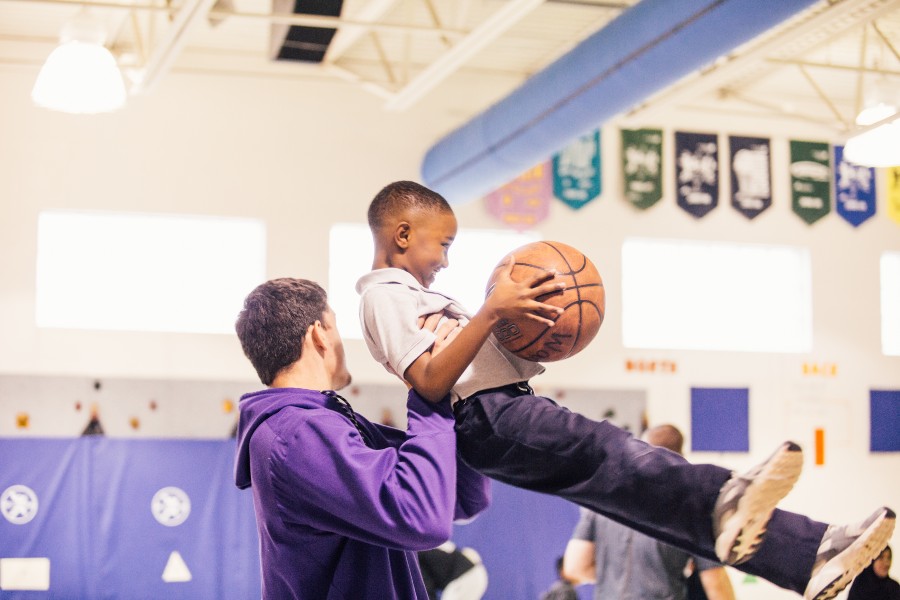
Every Thursday, a different athletic team coordinates the after-school Sports Fun Club at Carter-Lawrence Elementary to help students with homework, encourage them and build personal relationships while playing sports.
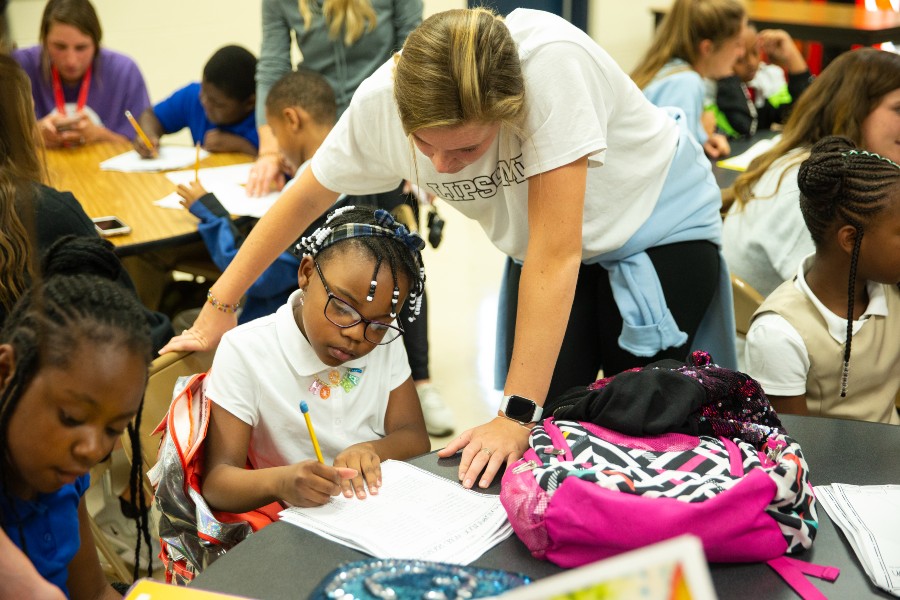
Over the years, literacy has become the number one goal of Fun Club, followed by 30 minutes of play, sports and fun.
Another pillar of the spiritual formation program is the 555 prayer program, where supporters in multiple states spend five minutes a day, five days a week praying for five Lipscomb student athletes. In the first year of the 555 program, Klotz found one prayer partner for every five students (around 300 students each year). In 2023-2024, he was up to four prayer partners per every five student athletes.
“Every time we have an athlete ask to be baptized in the (Bison Square) fountain, I go to their prayer partners and ask them to attend,” said Klotz. “It is a reminder that it is so much bigger than one person.”
That reminder of the big picture of life is also a guiding force behind the international missions portion of the spiritual formation program, called “global church visits.” Since 2012, nearly 900 people have participated in 58 Athletics-sponsored international mission trips to countries such as Uganda, Malawi, El Salvador, Scotland, Nicaragua, Dominican Republic, Honduras and Mexico.
Athletics’ mission trips are an international relational ministry, said Klotz, always involving some type of sports-related activities (in line with the gifts God has bestowed on these young adults, he says) as well as children’s programs, home visits and manual labor.
A simple yes to go on that trip led to my life being forever changed. — Olivia Doak (BS ’19)
Over the years, a multitude of projects have included a basketball court being built by the women’s basketball team, a baseball field built by the baseball team, and a playground built by the men’s basketball team all in the same community in the Dominican Republic. In Mexico, several teams a year work with long-term host partner Baja Missions to provide physical, emotional, medical and spiritual relief to consistent communities. In El Salvador, women’s soccer works alongside Sports Outreach staff to run soccer clinics, teach English class and serve at a special needs orphanage.
“Many of these students have never been on a mission trip, gone to church or served in a church. Their sport has always been about them,” said Klotz. “But what if, for the first time, sport is about something bigger than themselves? The international piece helps them stand outside of themselves and recognize that God ‘has given me a gift, but this gift is not just for me.’”
“My first semester of college, I became very intrigued in my faith. I was questioning a lot about Jesus, and I was hesitant to fully pursue a life with Him,” said Olivia Doak (BS ’19), former forward and captain on the women’s soccer team. “I was able to serve on a mission trip to El Salvador. A simple yes to go on that trip led to my life being forever changed. I was able to serve on four more athletic mission trips during my time at Lipscomb.
“I truly experienced a joy, peace, redemption and love that solidified my curiosity, which led me to fully surrender my life to Jesus in baptism,” she said.

Athletics’ mission trips are an international relational ministry, said Klotz, always involving some type of sports-related activities.

Since 2012, nearly 900 people have participated in 58 Athletics-sponsored international mission trips.
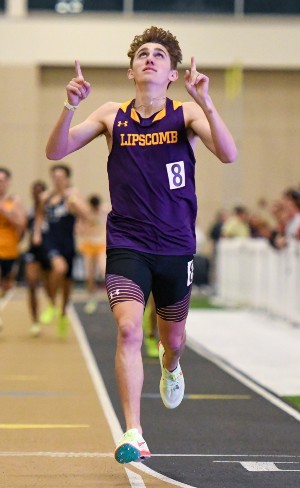
The program maximizes the perspective shift experienced through international missions by providing pre-mission prep sessions, devotional guides, and intentional follow-up after the trips.
“The athletics mission trips become a kind of spiritual culmination for our student athletes,” said Tyler Kemmerer, director of Lipscomb Missions. “After months of genuine conversation and love and study of God’s Word, these students go and experience God in a way they were never expecting.”
Beyond these tentpole programs, spiritual formation offers a busload of intentional opportunities for student athletes to grow their faith. Bible studies are held by team or for women only or men only, including the Sunrise Slayers, a group of male athletes who wake up early to meet, study the Bible and memorize scriptures. A coach’s Bible study is held with former Lipscomb women’s basketball coach and associate athletic director Frank Bennett (BA ’73, LA ’69) leading the reflections.
Students coordinate activities for the Fellowship of Christian Athletes chapter, and Klotz leads the Athletic Leadership Summit, made up of one representative from every team, meeting once a month to explore corporate leadership strategies and scriptural leadership models.
“The Leadership Summit has not only taught me about leadership and the facets of being a good leader, but about myself and how I can lead in all the positions I am in,” said Mason Nam (BS ’22), former men’s golf team captain. “The biggest thing I learned revolved around servant leadership and making an impact in the world.”
On the field, on the court, on campus, my favorite part is seeing lives radically transformed. — Chris Klotz
“Serving with spiritual formation has grown passions and interests in me that will guide how I live my life, how I love my friends and family, and the career I will pursue,” said Addi Pelham, a senior volleyball athlete. “I truly believe that serving with spiritual formation has made me more like Christ and reminded me that the desires of God should be on my heart as they are on His. And that the call on my life is to drop everything and follow Him!”
“I’m constantly asking God, how do we continue to grow,” said Klotz. “I want to keep building this program in a way that far outlasts us. The majority of our athletes are not here because of faith, but God brings them here and then literally changes their lives.
“On the field, on the court, on campus, my favorite part is seeing lives radically transformed.”
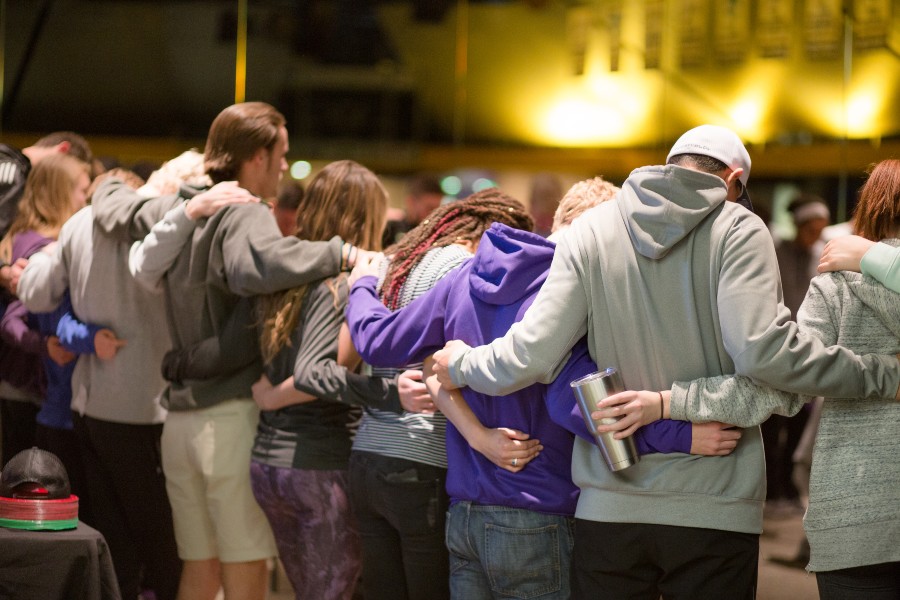
Serving with spiritual formation has grown passions and interests in me that will guide how I live my life, how I love my friends and family, and the career I will pursue,” said Addi Pelham, a senior volleyball athlete.